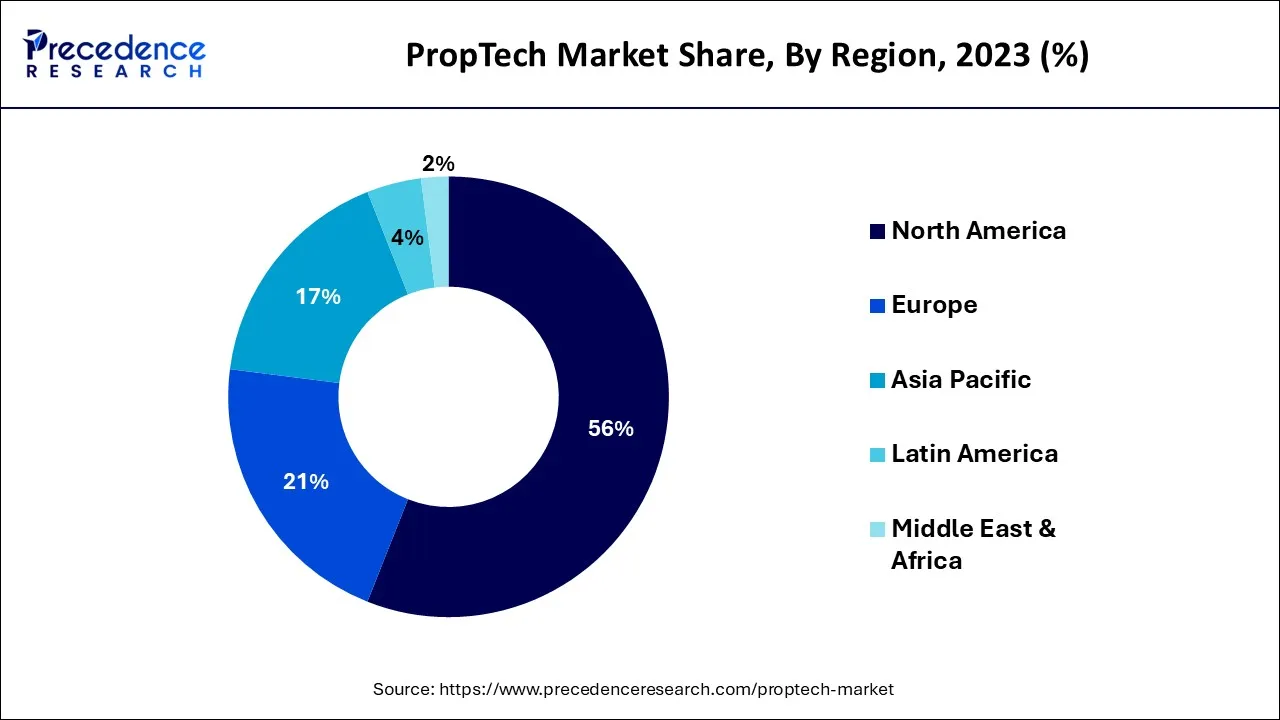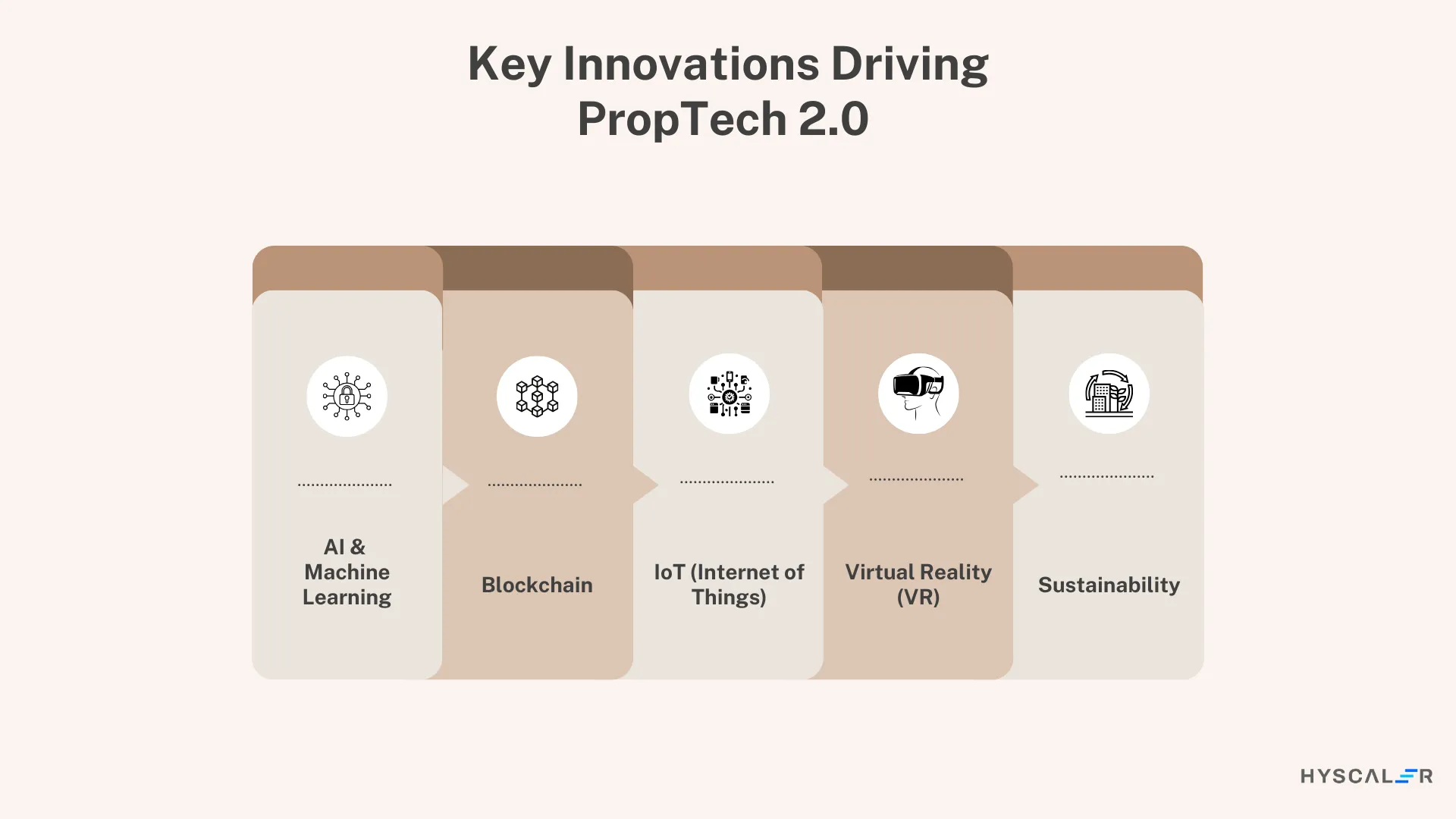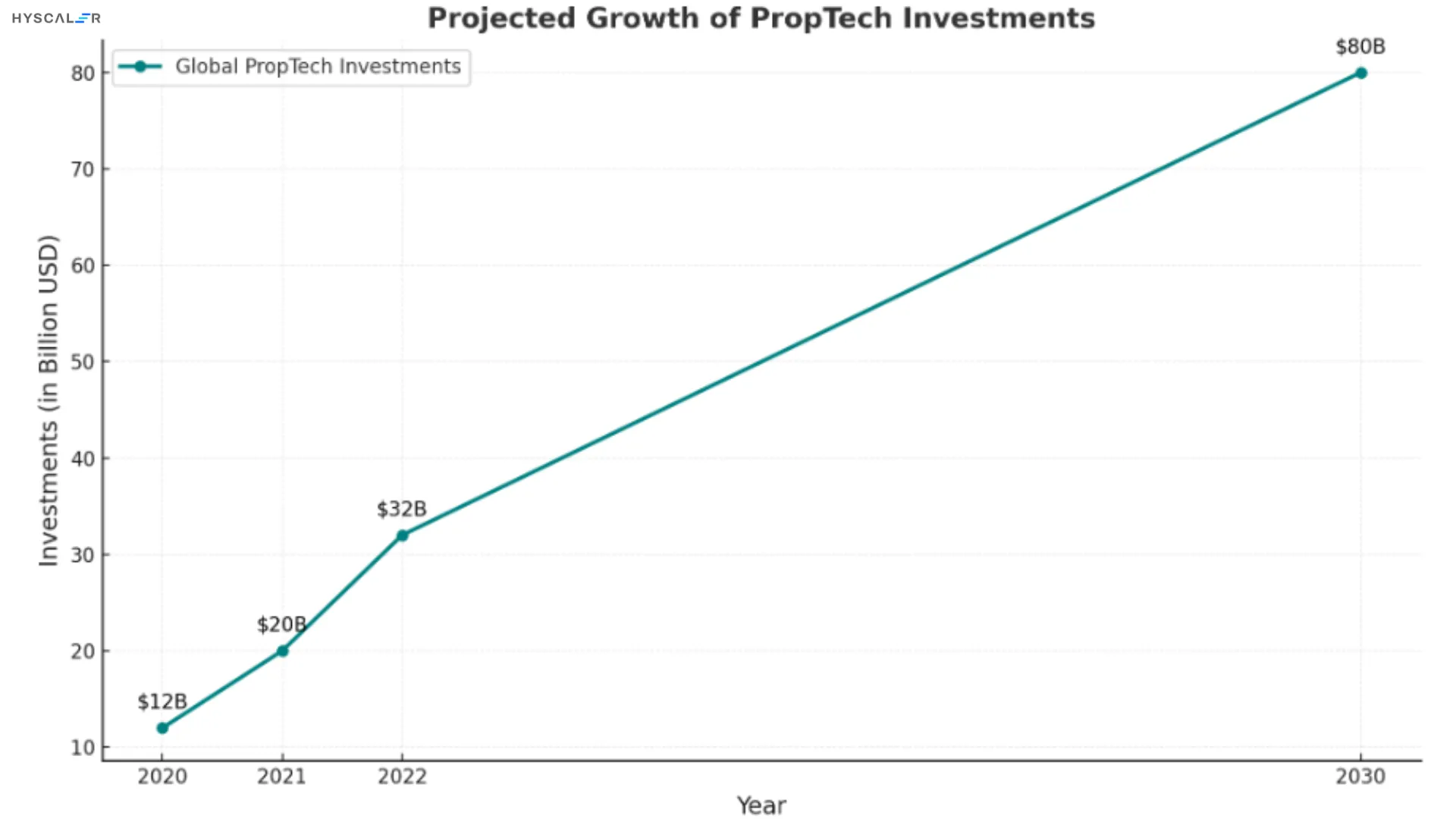Table of Contents
PropTech 2.0 is here—imagine walking through the house of your dreams without ever stepping outside, or closing a home purchase in just minutes using a blockchain-enabled smart contract. Welcome to the future of real estate, where creativity meets technology to redefine the entire industry.
The numbers speak for themselves– The Global PropTech market, with a 2022 value of $18.2 billion, is expected to exceed $86.5 billion by 2032, at a compound annual growth rate of 16.8%. Having adopted PropTech 2.0, over 80% of the commercial real estate companies are currently investing in digital transformation, PropTech 2.0 will no longer be a fad but be the building block of the future.
This second generation of PropTech in turn extends the original digital strides by incorporating AI-based insights, blockchain-enabled disclosure, and virtual augmented experiences. And it isn’t so much about making real estate greener, and smarter, it’s about reinventing the way we experience the buildings we occupy for living, working, and investing.
What is PropTech 2.0?
PropTech 2.0 is the next generation of property technology, moving beyond past digital tools to encompass next-generating technologies, such as AI, blockchain, IoT, and VR. While earlier PropTech focused on digitizing traditional processes, the new-gen integrates these advanced technologies to solve longstanding challenges in real estate.
This next generation of accessibility empowers investors, buyers, and property managers to act upon data-driven information, improved transparency, and better efficiency. This is changing the way we buy, sell, and manage real estate — through real-time property management with IoTs, and in the process making the entire process quicker, more secure, and better tailored.

Key Innovations Driving PropTech 2.0
AI and Machine Learning: AI and machine learning are transforming the real estate market, using big data to provide predictive information. Using these technologies, market movements are predicted, property values are predicted, and user preferences are predicted, all while automating elements that would otherwise have been handled (property management, for example, and customer interactions, for example). With the passage of time, machine learning algorithms keep on getting better, and make even more accurate predictions as well as optimizing operational efficiency.
Blockchain: Blockchain-based technology provides security and accountability to real property transactions by creating immutably recorded history. Buyers and sellers can conduct secure transactions in the absence of intermediaries via smart contracts, mitigating the risk of fraud and reducing the time required to execute processes such as reallocation of property and lease agreements.
IoT (Internet of Things): IoT makes it possible to tie devices and systems within a home to real-time monitoring. Sensors can log energy consumption, to name just one example, as well as building security, providing property owners with the ability to proactively manage maintenance, reduce operating costs, and improve their tenants’ quality of living.
Virtual Reality (VR): VR transforms how properties are showcased. Buyers are able to make fully immersive, 360° virtual viewable of properties, and feel the properties as they would any typical in real life regardless of whether these properties are brand new or still under construction. This technology is transforming how agents market properties and improving the buying experience.
Sustainability: PropTech 2.0 also focuses on the sustainability of technologies, including technologies such as improving energy efficiency and reducing environmental impact concerning the properties. Environmental building systems minimize waste and energy, and environmentally friendly building technology facilitates sustainable development. These advances help cut carbon emissions, improve resource utilization, and satisfy the growing consumer need for sustainable living.

Trailblazers in PropTech 2.0: Leading the Charge in Real Estate Innovation
Not only are the early adopters of PropTech 2.0 challenging the status quo, but they are also changing the real estate world. These visionary companies and investors are leveraging the capabilities of AI, blockchain, IoT, and sustainability to push the frontiers of what is possible in property management, sales, and investment.
Below is an idea of what some of the more significant players in PropTech 2.0 are accomplishing:
Zillow: Zillow has led in artificial intelligence-based real estate insight applications using machine learning in order to provide ultra-accurate home value predictions. As of 2023, Zillow’s Zestimate algorithm had powered more than 135 million home estimates, offering users AI-driven insights into home prices, trends, and valuation changes. Zillow is changing the way consumers buy and sell properties thanks to automation and predictive analytics according to Zillow’s 2023 Annual Report.
Redfin: Redfin has intelligence integrated into the house-search platform, providing highly customized suggestions to the user on the basis of individual user preference. The corporation also leverages machine learning technologies to fuel its RedfinNow, in which homes are acquired and sold quickly and directly through the platform, eliminating the need to navigate the traditional marketing structure. For 2022, Redfin reported more than $2 billion in revenue, as an indication of the potential of merging technology with real estate as stated in Redfin’s 2022 Financial Report.
Opendoor: As a pioneer in the digital real estate transaction market, Opendoor applies AI and data analytics in order to streamline home buying and selling. Through instant cash offers for properties, Opendoor has challenged conventional models resulting in more than 600,000 properties sold and purchased on their platform. According to Opendoor’s Q4 2023 Financial Report, in 2023, Opendoor achieved more than $8 billion in revenue, a result of its success in using technology to maximize operational efficiency and revenue.
Propy: Propy is a blockchain-powered real estate platform, that enables real estate buyers, sellers, and agents to carry out transactions by the help of smart contracts. With this technology, intermediaries are removed, security is improved, and property transfers are streamlined. As of the Propy Annual Report 2023, Propy’s platform has been successful in closing transactions on the real estate market of multiple countries, for the amount of more than $3 million, indicating the rising attractiveness of blockchain in real estate.
WeWork: WeWork has spearheaded the integration of the Internet of Things and smart building technologies in its business model. Using sensor embedding in workspaces, the company records and analyzes, among others, air, lighting, and energy/consumption, such that the office environment is optimized. This has already been used to lower the amount of energy consumption WeWork can achieve in some areas to 30% by WeWork Sustainability Report 2023 and to improve the user experience by using data-driven personalization.
Overcoming the Roadblocks: Challenges and Solutions in PropTech 2.0
Intermittency and Reliability of Real-Time Data
Challenge: PropTech 2.0 is very much a data-driven business, using real-time data feeds from IoT devices, and data-driven decision support tools such as AI analytics. However, it is challenging to maintain continuous, accurate, and repeatable data streams, particularly in areas of poor connectivity or system failures. These disruptions can impact decision-making and operational efficiency.
Solution: Edge computing and 5G network integration enhance the quality of data by minimizing latency and providing continuous connectivity. Deloitte has reported, that edge computing could reduce data transfer costs by 20% and steps in the direction of real-time processing efficiency.
Infrastructure and Implementation Costs
Challenge: Implementing PropTech 2.0 technologies, such as smart building systems, AI analytics, and blockchain, requires significant investment in infrastructure and training. This high cost can deter smaller companies or legacy players from adopting these innovations.
Solution: As a result, PropTech is becoming more accessible through affordable cloud-based solutions and subscription models by decreasing the initial need for a physical infrastructure. According to a study from McKinsey, the use of the cloud in real estate can achieve up to a 30% reduction in IT operational costs. In addition, governmental support and technology provider partnerships are reducing early spending.
Regulatory and Compliance Challenges
Challenge: Regulatory uncertainty around emerging technologies, such as blockchain for property transactions or AI for tenant screening, creates hesitancy among businesses to adopt PropTech. Differences in regional legislation complicate scaling solutions globally.
Solution: Collaboration between PropTech firms and policymakers is essential to create a standardized regulatory framework. World Economic Forum projects that steps to harmonize real estate regulations with PropTech innovations can in turn speed up the T&A and comply with data protection and privacy regulations.
Limited Digital Literacy Among Stakeholders
Challenge: There is a lack of understanding of advanced technology among many real estate professionals, property managers, and tenants, which has a barrier to the adoption of PropTech tools and services. This digital knowledge deficit can postpone adoption and diminish the perceived utility of these technologies.
Solution: A gap can be narrowed by providing ease-of-use interfaces and by supporting digital literacy programs. As stated in a PwC report, companies making an investment in training employees for emerging technologies show a 40% increase in adoption rates and overall effectiveness.
The Final Word: PropTech 2.0 and the Path Forward
With the development of PropTech 2.0, it is an undeniable fact, that the real estate sector is impacted. According to a report by PwC, global investments in PropTech surpassed $32 billion in 2022, highlighting the sector’s rapid growth. Technological advancements such as AI-driven property management services, blockchain transactions, and smart buildings equipped with IoT, are transforming traditional practices in a more efficient, transparent, and sustainable manner. In an era where sustainability plays a central role, green technologies and energy-saving design have awoken to reshape the real estate market over the coming years.

Looking forward, PropTech 2.0 may well charter the course for experiential, personalized, immersive experiences incorporating technologies like virtual reality and the metaverse. According to 2030 expert predictions, 80% of property searches will include virtual tours, thus changing prospectively the relationship between potential buyers/renters and real estate. With businesses continually evolving and innovating, it is not just vital to adopt these technologies but also to utilize new options for expansion.
Step into the future of real estate today—embrace the power of PropTech 2.0 and unlock limitless possibilities.